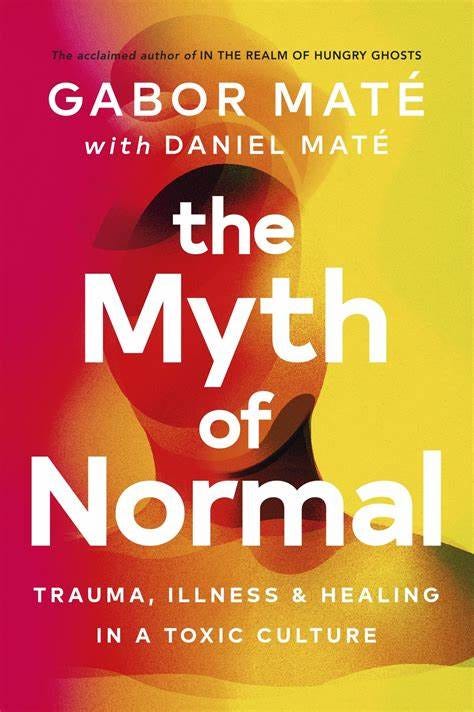The Myth of Normal (Gabor Maté)
Book in a Nutshell: This edition was shaped by a book that stayed with me - and what it reveals about how we lead, grow, and live.
What genre? Trauma, Healing, Human Psychology
Why read? Written by physician and trauma expert Gabor Maté, this book questions how much of what we accept as ‘normal’ is actually healthy. It explores the links between chronic stress, emotional repression, trauma, and illness, and invites us to rethink wellness both personally and systematically. In a world of accelerating demands, technological shifts, and rising disconnection, these insights are especially urgent for those in leadership or caregiving roles. As we shape the future of work, this book reminds us: sustainable leadership starts with understanding the human nervous system - and reshaping the cultures we call high-performing.
Concepts That Inspired Me
Our Coping Can Become Our Constraint: Many behaviors we admire (perfectionism, selflessness, relentless drive) often begin as survival strategies. Maté observes that traits like automatic suppression of healthy anger, an overwhelming sense of duty, a compulsive concern for the emotional needs of others, and a rigid identification with social roles are common among those who suffer chronic illness - not as causes, but as patterns of over-adaptation that disconnect us from our own needs. In leadership, this insight challenges us to pause and ask: are we acting from clarity and purpose, or from an unconscious need to please, prove, or protect? Growth begins when we can tell the difference. And healing begins when we realize that wholeness includes honoring our limits, not just our performance.
Trauma Isn’t What Happened To You - It’s What Happened Inside of You: One of Maté’s powerful insights is that trauma isn't defined by a traumatic event - but by how alone and unsafe we felt in the aftermath of it. It lives in what gets left unprocessed when we don’t feel safe, seen, or supported. For leaders and teams, this means our environments matter deeply. The emotional environment we create matters deeply - not just in crisis, but in every meeting, every conversation. When people don’t feel safe to speak, to stretch, or to show up fully, they adapt in ways that protect them but also limit their contribution.
The Culture We Normalize Can Be the Source of Our Suffering: Maté challenges the norms we rarely question like pushing through exhaustion, numbing our emotions, measuring our worth through output. What’s considered “high-performing” is often disconnected from what’s healthy. In leadership spaces, we need to reexamine how we define success. Are we rewarding survival modes, or supporting environments where people can thrive? True transformation begins when we shift not just individual behaviors, but collective expectations.
Excerpts I Enjoyed Reading
On the body’s silent protest:
“When the mind says, ‘I must keep going,’ and the heart says, ‘I’m not okay,’ the body listens to the heart. Illness is often the only voice we allow ourselves to hear.”
On early adaptation and adult identity:
“The personality we build to survive early life isn’t who we are - it’s who we had to become. Healing asks: What parts of me were strategies? And which ones are truly mine?”
Question I’m Asking Myself
What part of me have I been silencing, just to be seen as strong?
With love, Vanessa


